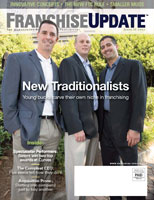A self-serving (but objective) analysis
An acquaintance (not a lawyer) who is working on a book on franchising, recently asked me to review her manuscript and make appropriate editorial suggestions. In her chapter on buying a franchise, she strongly recommends, as would I, that a prospective franchise purchaser hire a lawyer who is experienced in franchising to counsel him (or her) with respect to this investment.
Her words were so strong I felt that I had been placed on a pedestal - given a special role in our society. Lawyers, conceited as we are to begin with, already feel that we have been granted special status when we received our law degrees and became members of that precious fraternity known as "The Bar." But this experience was a double dip. I am not just a lawyer, but a franchise lawyer! Am I thus entitled to two stripes? Is being a corporal rather than a private in the legal community something to get a swelled head over?
I have thought long and hard over this proposition during the last few months. Are we franchise lawyers "special," as the Church Lady on Saturday Night Live used to say?
Now, admittedly I have a certain bias on this subject. I, a member of this noble class, am trying to determine whether the class is worthy of special recognition. Nevertheless, putting my predilections for self-promotion of worth aside, I decided to test the hypothesis in the real world.
Using anecdatal empiricism,* I looked critically at various situations that have come to my attention and asked this question: If the lawyer in these situations had a solid background in commercial law, but no significant background in franchising, would the results have been different? That may sound somewhat abstract, but let's look at some real-life situations from both the franchisor and franchisee perspectives to see what the proper conclusion might be.
A franchisee often needs a franchise specialist when he first buys his franchise, or when a dispute with the franchisor ensues. For the franchisor, the most common need for legal services occurs when establishing the franchise system and, again, when disputes arise.
1) The franchise purchase. Will a franchise specialist add value to the process? Generally, yes. I have observed all too often situations in which the prospective franchisee hires legal counsel who, unfamiliar with franchising, either adds nothing to the process or over-lawyers the situation. The do-nothing lawyer has generally been told that the documents are non-negotiable and therefore it would be fruitless to raise legitimate concerns for his client, and he accepts this on faith. Alternatively, he does not understand the implications of many provisions, such as the effect of a post-term non-compete on the value of real estate where there is a special-use building, and thus the client does not fully understand the consequences of being a franchisee. On the other side of the valley is the lawyer who nits and picks at every provision of the franchise agreement, not recognizing that most franchisors are not willing to engage in custom-tailoring their franchise agreements without a special reason to do so.
Keep in mind that in either of these scenarios, the client may have told his attorney that he wants the best representation possible - even though it may cost him up to $500! While $500 is probably not a realistic fee, the lawyer who already knows how to approach the situation will give his client more bang for the buck. His ability to assess whether there may be leverage can result in a huge saving of lawyer energy, and consequently cost. While established franchisors with prospective franchisees lined up outside the door may not be willing to negotiate, startups and financially weak franchisors may be more flexible. A client who can commit to buying territorial rights, a celebrity, or a minority candidate, all have chips that might be useful in this poker game. A skilled franchise lawyer will be equipped to recognize and exploit these strengths.
2) Representing a franchisee or a franchisor in a dispute. What about the situation in which a dispute involving the franchise relationship arises? Suppose the franchisee has allegedly not been complying with operating requirements? And let's assume that the franchise agreement does not provide that litigation must be brought in a particular state, but does provide that a particular state's laws will govern. We will use Georgia law as the designated law and assume, further, that the franchisee is located in Michigan.
Michigan law is generally more favorable than Georgia law when it comes to franchise relation disputes. Michigan's Franchise Investment Law, though not ideal from the franchisee vantage point, nevertheless gives franchisees rights they might otherwise not have under Georgia law. If suit is filed in Michigan, the courts there generally will apply the Michigan statute to protect its citizens, even when the parties have selected a different state's law to control.
On the other hand, Georgia is an odd bird when it comes to non-competes. The Georgia courts have a long tradition of dislike toward post-term non-competes. A lawyer lacking this knowledge, in the context of a post-term noncompete dispute, might have the proclivity to bring the case in the franchisee's backyard (Michigan) and argue that Michigan law should be applied, when in fact his client might have been better off before the Georgia courts and/or applying Georgia law. If the dispute had been over system standards, however, then Michigan may have been the better jurisdiction in which to do battle. The same type of considerations are generally applicable when one is representing a franchisor. Again, lacking the "know-how" of how the system works may lead to poorer legal representation here as well.
3) Starting up a franchise system. It is here where I have seen situations that send chills up my spine. As many of the readers of this column may be aware, the American Bar Association's Forum on Franchising sponsors a list-serve on which lawyers (and some non-lawyers) post questions and comments on franchise law and related matters. It is a wonderful tool for the practitioner because it gives lawyers availability to information based on others' experience. Franchise law is a relatively young field (35 years old, perhaps), and many of the answers to legal and practical questions are not readily available, even to experienced franchise lawyers.
However, there are postings - and they are not infrequent - where it is clear that the inquiring lawyer is so far out of his element that one questions whether he should be advising a client at all on the franchise registration and disclosure process: Do I have to file my documents with the FTC? Does my client really need audited financial statements?
These are very basic questions, and it is unfortunate that business people are paying these attorneys, who are clearly not able to provide, without further training, appropriate representation. My colleagues in this field generally produce high-quality work, but some of the stories that state regulators tell about deficient filings are appalling. Some of these occur when the client decides to handle the preparation of a UFOC himself; in other cases, the poor work is performed by attorneys unfamiliar with the field.
Is this article an attempt by one competitor (me) to foreclose or limit competition? Of course - but only competition from those not competent to play the game. How does a novice join the fraternity? By paying his dues, as have most of the established franchise law practitioners. Read about the subject. And if appropriate, become an apprentice. Hire a law firm with experience to review your work and counsel you on a training project. My firm had no expertise when we did our first UFOC in 1979. However, proper mentoring and basic research into the regulatory scheme led us to meet our first franchisor client's needs and provide our entry into the franchise law arena. Was it worth the effort? It was the best investment of my career.
4) My conclusion. There is no substitute for experience and brains. Perhaps claiming that franchise lawyers should be put on pedestals is a bit grandiose. But as should be the case when hiring any expert, check their credentials before you commit.
If you are a prospective franchisee you will be making what may be the largest or second largest investment of your life. If you are a franchisor, the foundation of your business plan can be shattered if you have put your money on the wrong horse when it comes to legal advice. When it comes to hiring legal talent, let's pull out the phrase the FTC likes so well: "Investigate before you buy."
Rupert Barkoff is a partner in the Atlanta office of Kilpatrick Stockton LLP, where he chairs the firm's franchise practice. He is a past chair of the American Bar Association's Forum on Franchising, and co-editor in chief of Fundamentals of Franchising.
Share this Feature
Recommended Reading:
FRANCHISE TOPICS
- Multi-Unit Franchising
- Get Started in Franchising
- Franchise Growth
- Franchise Operations
- Open New Units
- Franchise Leadership
- Franchise Marketing
- Technology
- Franchise Law
- Franchise Awards
- Franchise Rankings
- Franchise Trends
- Franchise Development
- Featured Franchise Stories
FEATURED IN

Franchise Update Magazine: Issue 2, 2007








 The franchise listed above are not related to or endorsed by Franchise Update or Franchise Update Media Group. We are not engaged in, supporting, or endorsing any specific franchise, business opportunity, company or individual. No statement in this site is to be construed as a recommendation. We encourage prospective franchise buyers to perform extensive due diligence when considering a franchise opportunity.
The franchise listed above are not related to or endorsed by Franchise Update or Franchise Update Media Group. We are not engaged in, supporting, or endorsing any specific franchise, business opportunity, company or individual. No statement in this site is to be construed as a recommendation. We encourage prospective franchise buyers to perform extensive due diligence when considering a franchise opportunity.